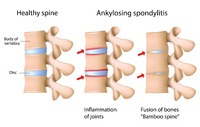Ankylosing spondylitis
Ankylosing spondylitis is a form of ongoing joint inflammation (chronic inflammatory arthritis) that primarily affects the spine. This condition is characterized by back pain and stiffness that typically appear in adolescence or early adulthood. Over time, back movement gradually becomes limited as the bones of the spine (vertebrae) fuse together. This progressive bony fusion is called ankylosis.
The earliest symptoms of ankylosing spondylitis result from inflammation of the joints between the pelvic bones (the ilia) and the base of the spine (the sacrum). These joints are called sacroiliac joints, and inflammation of these joints is known as sacroiliitis. The inflammation gradually spreads to the joints between the vertebrae, causing a condition called spondylitis. Ankylosing spondylitis can involve other joints as well, including the shoulders, hips, and, less often, the knees. As the disease progresses, it can affect the joints between the spine and ribs, restricting movement of the chest and making it difficult to breathe deeply. People with advanced disease are also more prone to fractures of the vertebrae.
Ankylosing spondylitis affects the eyes in up to 40 percent of cases, leading to episodes of eye inflammation called acute iritis. Acute iritis causes eye pain and increased sensitivity to light (photophobia). Rarely, ankylosing spondylitis can also cause serious complications involving the heart, lungs, and nervous system.
Ankylosing spondylitis is part of a group of related diseases known as spondyloarthropathies. In the United States, spondyloarthropathies affect 3.5 to 13 per 1,000 people.
Ankylosing spondylitis is likely caused by a combination of genetic and environmental factors, most of which have not been identified. However, researchers have found variations in several genes that influence the risk of developing this disorder.
The HLA-B gene provides instructions for making a protein that plays an important role in the immune system. The HLA-B gene is part of a family of genes called the human leukocyte antigen (HLA) complex. The HLA complex helps the immune system distinguish the body's own proteins from proteins made by foreign invaders (such as viruses and bacteria). The HLA-B gene has many different normal variations, allowing each person's immune system to react to a wide range of foreign proteins. A variation of the HLA-B gene called HLA-B27 increases the risk of developing ankylosing spondylitis. Although many people with ankylosing spondylitis have the HLA-B27 variation, most people with this version of the HLA-B gene never develop the disorder. It is not known how HLA-B27 increases the risk of developing ankylosing spondylitis.
Variations in several additional genes, including ERAP1, IL1A, and IL23R, have also been associated with ankylosing spondylitis. Although these genes play critical roles in the immune system, it is unclear how variations in these genes affect a person's risk of developing ankylosing spondylitis. Changes in genes that have not yet been identified are also believed to affect the chances of developing ankylosing spondylitis and influence the progression of the disorder. Some of these genes likely play a role in the immune system, while others may have different functions. Researchers are working to identify these genes and clarify their role in ankylosing spondylitis.
Although ankylosing spondylitis can occur in more than one person in a family, it is not a purely genetic disease. Multiple genetic and environmental factors likely play a part in determining the risk of developing this disorder. As a result, inheriting a genetic variation linked with ankylosing spondylitis does not mean that a person will develop the condition, even in families in which more than one family member has the disorder. For example, about 80 percent of children who inherit HLA-B27 from a parent with ankylosing spondylitis do not develop the disorder.
- AS
- Bechterew disease
- Marie-Struempell disease
- spondylarthritis ankylopoietica
- spondylitis ankylopoietica
- spondylitis, ankylosing
- spondyloarthritis ankylopoietica
Related Information
- Brown MA. Breakthroughs in genetic studies of ankylosing spondylitis. Rheumatology (Oxford). 2008 Feb;47(2):132-7. Epub 2007 Nov 22. Review.
- Helmick CG, Felson DT, Lawrence RC, Gabriel S, Hirsch R, Kwoh CK, Liang MH, Kremers HM, Mayes MD, Merkel PA, Pillemer SR, Reveille JD, Stone JH; National Arthritis Data Workgroup. Estimates of the prevalence of arthritis and other rheumatic conditions in the United States. Part I. Arthritis Rheum. 2008 Jan;58(1):15-25. doi: 10.1002/art.23177.
- Khan MA. HLA-B27 and its pathogenic role. J Clin Rheumatol. 2008 Feb;14(1):50-2. doi: 10.1097/RHU.0b013e3181637a38. Review.
- Khan MA. Polymorphism of HLA-B27: 105 subtypes currently known. Curr Rheumatol Rep. 2013 Oct;15(10):362. doi: 10.1007/s11926-013-0362-y. Review.
- Kim TH, Uhm WS, Inman RD. Pathogenesis of ankylosing spondylitis and reactive arthritis. Curr Opin Rheumatol. 2005 Jul;17(4):400-5. Review.
- Lee YH, Rho YH, Choi SJ, Ji JD, Song GG. Ankylosing spondylitis susceptibility loci defined by genome-search meta-analysis. J Hum Genet. 2005;50(9):453-9. Epub 2005 Sep 21.
- Martin TM, Zhang G, Luo J, Jin L, Doyle TM, Rajska BM, Coffman JE, Smith JR, Becker MD, Mackensen F, Khan MA, Levinson RD, Schumacher HR, Wade NK, Rosenbaum JT, Reveille JD. A locus on chromosome 9p predisposes to a specific disease manifestation, acute anterior uveitis, in ankylosing spondylitis, a genetically complex, multisystem, inflammatory disease. Arthritis Rheum. 2005 Jan;52(1):269-74.
- Reveille JD. The genetic basis of ankylosing spondylitis. Curr Opin Rheumatol. 2006 Jul;18(4):332-41. Review.
- Robinson PC, Brown MA. Genetics of ankylosing spondylitis. Mol Immunol. 2014 Jan;57(1):2-11. doi: 10.1016/j.molimm.2013.06.013. Epub 2013 Jul 31. Review.
- Shamji MF, Bafaquh M, Tsai E. The pathogenesis of ankylosing spondylitis. Neurosurg Focus. 2008;24(1):E3. doi: 10.3171/FOC/2008/24/1/E3. Review.
- Sims AM, Wordsworth BP, Brown MA. Genetic susceptibility to ankylosing spondylitis. Curr Mol Med. 2004 Feb;4(1):13-20. Review.
- Zhang G, Luo J, Bruckel J, Weisman MA, Schumacher HR, Khan MA, Inman RD, Mahowald M, Maksymowych WP, Martin TM, Yu DT, Stone M, Rosenbaum JT, Newman P, Lee J, McClain JA, West OC, Jin L, Reveille JD. Genetic studies in familial ankylosing spondylitis susceptibility. Arthritis Rheum. 2004 Jul;50(7):2246-54.


